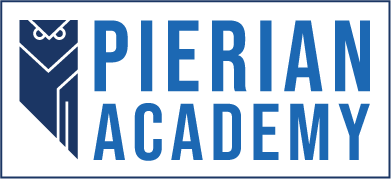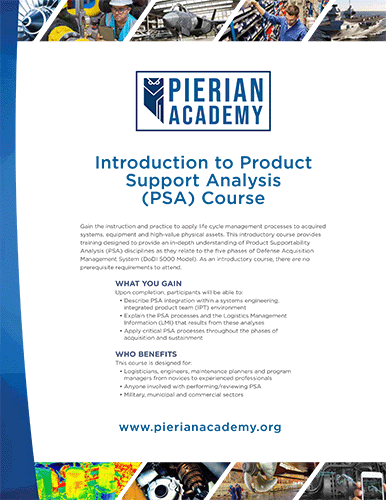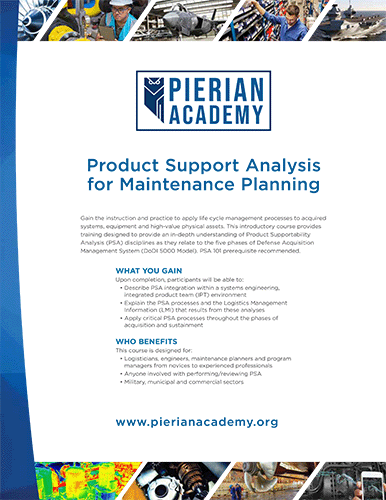Product Support Analysis (PSA) Training
The Standard for Excellence
About PSA Training
Product Support Analysis (PSA) training teaches a systems-engineering process to identify resources required to develop the logistical support systems to complete operational and maintenance tasks to maintain equipment.
PSA influences the design of complex systems to reduce ownership costs and finds cost-effective alternatives to maintain systems and equipment.
Applicable industries include, but are not limited to Manufacturing, Pharmaceutical, Food Processing, Chemical Processing, Mining, Facilities, Weapon Systems, Aerospace, Agriculture, Alternative Energy, Energy Distribution, and Power Generation.
The Goal
Product Support Analysis (PSA) is the set of detailed tasks used to identify the resources required to develop and sustain a support system for fielded equipment.
SAE GEIA-STD-0007 & SAE TA-STD-0017
(Society of Automotive Engineers)
The technical standard: Product Support Analysis (PSA) SAE GEIA-STD-0007 identifies the range of logistics product data elements that can be generated because of the supportability analysis conducted during the design, development, and initial fielding of a system, end item, or product. This standard designs and delivers a standardized definition of data elements or set of data tags for Logistics Product Data which is a subset of Product Support Analysis (PSA.) SAE TA-STD-0017 establishes descriptions of activities which, when performed in a logical and iterative nature, comprise the Product Support Analysis (PSA) process.
Developed to replace the LSA process outlined in MIL-1388, GEIA-STD-0007 covers Logistics Product Data.
What You Will Learn:
- Understanding of PSA disciplines as they relate to the five phases of the Defense Acquisition Management System (DoD Instruction 5000)
- Applications for lifecycle management processes to acquired systems, equipment, and physical assets
- Supportability processes for in-service systems
- Concepts, principles and current reference standards which guide PSA and Logistics Product Data (LPD)
- Optimizing the mix of product support resources for dynamic scheduling of scheduled and unscheduled maintenance
Types of PSA Training
PSA training is a cumulative process beginning with an overview introduction for all team members involved in PSA processes and ending in advanced concepts such as proposed values and measurements in Performance Based Logistics agreements. The PSA course offerings reflect the tiered needs of learners at the beginner, intermediate and advanced levels.
PSA 101 • Introduction to Product Support Analysis
PSA 103 • Supportability and Sustainment
PSA 201 • Advanced Product Support Analysis Implementation
PSA 301 • Supportability Optimization
Benefits of PSA Training
- Understanding of PSA disciplines as they relate to developing effective maintenance programs
- Theory and practical experience needed to implement and perform PSA
- Experience developing effective failure management strategies
- An understanding of PSA’s role within asset management
Who is PSA for?
Intended for anyone who will be involved in performing PSA:
- Fleet/asset managers
- Maintenance planners/managers
- Reliability managers/engineers
- Field service representatives
- Logisticians
- Maintenance technicians
- Supportability professionals
History of PSA
PSA (Product Support Analysis) arose from LSA (Logistics Support Analysis) which was codified in 1973 with military standard MIL-STD-1388-1. LSA guidelines were further established in the DoD (Department of Defense) Instruction 5000.2 on major system acquisition procedures and DoD Directive 5000.39 on the acquisition and management of integrated logistic support (ILS) for systems and equipment.
In 1996 after being downgraded from a standard to a best practice, MIL-STD-1388 was canceled and several civilian initiatives took its place.
The Society of Automotive Engineers (SAE) introduced GEIA-STD-0007 in 2007.
PSA Class Modules
PSA 101
Module 1 – Supportability Overview
Module 2 – Material Solution Analysis
Module 3 – Technology Maturation and Risk Reduction Phase
Module 4 – Engineering and Manufacturing Development (E&MD) Phase
Module 5 – Production and Deployment / Operations and Support
Module 6 – Contracting for Product Support Analysis
Choose Your PSA Training
PSA 101
Introduction to Product Support Analysis
An introductory course designed to provide an understanding of Product Support Analysis (PSA) disciplines related to the five phases of the Defense Acquisition Management System (DoD Instruction 5000). Gain the instruction and practical application needed to apply life cycle management processes to acquired systems, equipment, and high-value physical assets. This course offers an overview using guidance from the GEIA-STD-0007 and SAE-TA-STD-0017. It is intended for anyone who will be involved in performing PSA.
Prerequisite: None
Course Duration: 4 Days
Cost: $1,099 per student
PSA 103
Supportability and Sustainment
An intermediate level course that builds on the knowledge gained in PSA101 (Introduction to Product Support Analysis). Gain the instruction and practical application needed to apply supportability processes to in-service systems, equipment, and high-value physical assets. Intended for logisticians who require a deeper understanding of Supportability and its application to Sustainment.
Prerequisite: PSA 101
PSA 201
Advanced Product Support Analysis Implementation
An advanced level course designed to provide an in-depth understanding of the concepts, principles, and benefits of Product Support Analysis (PSA) throughout the life cycle. Learn how to optimize the mix of product support resources for optimization of scheduled and unscheduled maintenance. Students will also learn to articulate the Business Case to support decisions made during the Product Support Analysis process. Intended for experienced logisticians and supportability professionals.
Prerequisite: PSA 101 & 103
PSA 301
Supportability Optimization
An advanced level course designed to provide an in-depth understanding of the concepts, principles, and benefits of Product Support Analysis (PSA) in terms of measurement and application to Performance-Based Logistics. Learn how to measure Supportability, influence performance, and cost through selection of the Product Support Elements and Optimize Performance and Cost simultaneously. Intended for highly experienced logisticians and supportability professionals.
Prerequisite: PSA 103 & 201, FMECA 101


